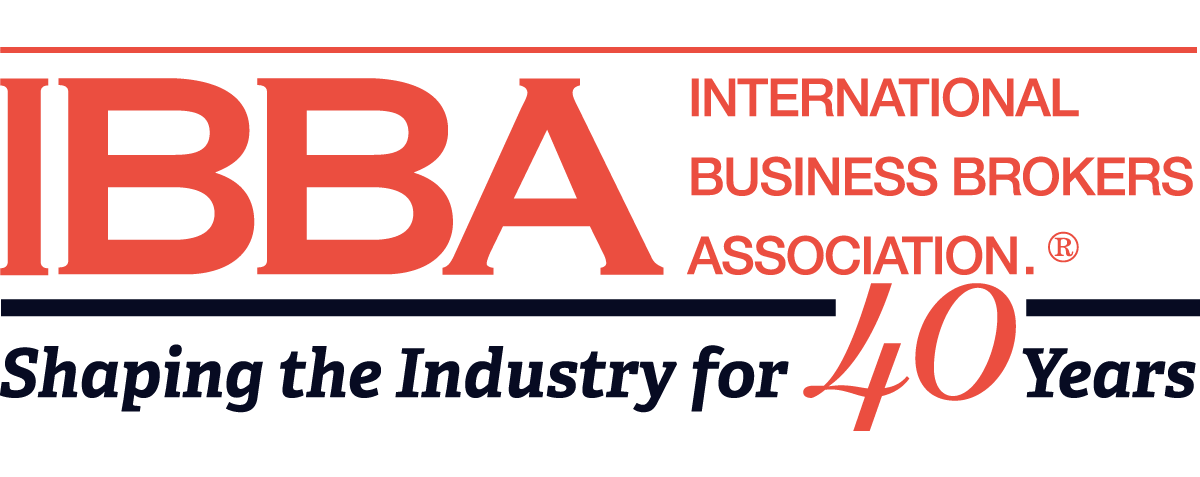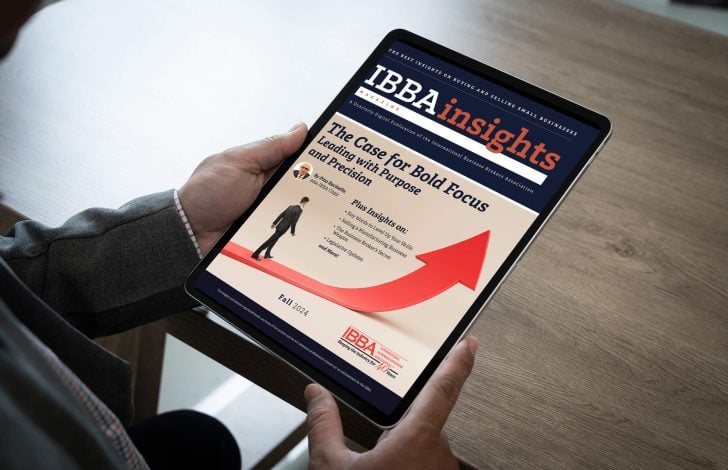IN THIS ISSUE:
Letter From The Chair
Barry J. Berkowitz, PhD, CBI, M&AMI

Finishing Strong
It’s hard to believe we’re starting to enter the final months of 2020 already. And it’s even harder to believe we’ve all been grappling with the COVID pandemic for 6 months now. The physical, emotional, societal, and financial challenges are personally unlike anything I’ve experienced in my lifetime (and I’ve been around for quite a while.) It has certainly tested the fortitude of even the strongest.
On the surface it can continue to feel like doom and gloom. However, what I’m seeing and hearing at the association level and from individual Business Brokers, continues to be especially encouraging. Many Business Brokers are busier than ever. Many are onboarding new Brokers. Many are investing in their education. And despite the odds, IBBA Membership is actually up about 8% from this time last year. And, the IBBA has delivered to our Members nearly $750,000 in value YTD from our benefit partner programs alone.
The spirit to rise and overcome, and to support others, is what will continue to get us through. And as we head into the final turn of this year, now is the time to press hard toward the finish line of 2020. We can still accomplish our individual and collective goals, albeit perhaps not in the ways we initially envisioned.
That’s exactly what the IBBA is committed to doing through the end of this year. Just recently, we launched our IBBA Women’s EmpowHER Network and Online Supplier Directory, both key programs we identified for this year. And for the first time in IBBA history we hosted a Summit virtually, and with very positive feedback. We didn’t necessarily do these things as, or when, originally planned, but we got them done (with a lot of help from our dedicated volunteers). As for the balance of this year, we’re going to continue our emphasis on distance learning development to meet the growing demand for more virtual education across a spectrum of topics.
I know we’re not a perfect association, and frankly never will be. But I think what Members see is an ongoing, consistent commitment to setting and executing initiatives that are consistent with our mission and provide value to the Business Brokerage community. Every year we’re only getting better. In fact, our recent member satisfaction survey resulted in the association’s second highest Net Promoter Score in the last 5 years. Soon we will be hosting a member webinar to share the details of that survey. I hope you will participate.
No doubt about it, we will all continue to face our challenges through the remainder of this year. But if we continue to support each other, continue to focus on adaptation and execution, and continue to strive for improvement, 2020 can still be a year of great strides and accomplishment. Remember, it’s not about how you start, or how you stumble along the way, it’s about how you finish. And together, we can still finish this year strong.
Barry J. Berkowitz, PhD | CBI, M&AMI | Berkowitz Acquisitions | [email protected]
Working with Lawyers to Get Your Deal Closed
Randy J. Bring, P.A., CBI, CM&AP

In my 20 years as a Business Broker, I have dealt with probably a few hundred attorneys. While they are all different, some great, some certainly less than great, I have learned a few things along the way about working with them. Importantly, I have learned how to create a professional alliance with the lawyer(s) involved in a transaction to ensure I create an open line of communication. This allows me to keep the transaction relatively stress free and ultimately gets me to the finish line.
When I ask for my Buyer or Seller’s attorney information the first thing I do is communicate with their attorney. I send an email introducing myself and my firm with my contact information. In just a sentence, I explain my role in the transaction and I how I am there to support the process and their work by being an involved facilitator. I make clear that I would appreciate regular communication from her especially if she sees an issue developing that might delay or prevent the deal from closing. A trick I use is to attach a simple form spread sheet which lists all the parties in the deal by name, company, telephone contact and email. This includes the lawyers, brokers, accountants, lenders, landlord, etc. I know this favor is appreciated by every lawyer who receives it as a printout of the same will often appear on the inside of their client folder (I have seen mine many times). I know some brokers who will also send a deal “teaser” summarizing the transaction and, for larger deals, might also see fit to attach the CIM for the attorney to get caught up with the entirety of the transaction at the start of the process.
Too often, a business broker will develop an adversarial position with their client’s attorney and many times this is caused by the Broker’s unwillingness to stay involved in the transaction from contract to closing. I recently spoke with Deborah Carman, a transactional attorney in Boca Raton, FL. She told me she occasionally deals with Broker’s who are “not willing or able to work as a team” and that she questions the professionalism of brokers that “come to the closing whom I have not seen nor heard from them through the entire process”. She added, “I need to be able to discuss any issues with the brokers so that we may put our heads together and resolve any issues before they mushroom”.
As the deal progresses, I make sure the lawyer is updated and copied in on significant developments along the way especially if these developments are deal contingencies. This includes:
- Buyer “signing off” on due diligence
- Buyer receiving a lender commitment letter
- Approval by franchisor for a new/assignment of franchise agreement
- Landlord approval of requested lease assignment
It is important not to rush the process. Matt Katz, an M & A attorney in Ft. Lauderdale, FL was recently asked what he sees as a common mistake made by the broker-intermediary. He responded, “Setting unrealistic time frames for completion of activities or closing given the work the be performed and the numerous parties involved in the transaction”. When I questioned Matt how an intermediary can best work with him he responded, “First, resolving business issues with the client and the purchaser. Second, facilitating communications with the client on issues and risks and providing the broker’s perspective based on the broker’s experience in transactions”.
Knowing communication with the lawyers is essential to a smooth transaction, I am also sensitive of their professional time and am careful to make contact only when I have something significant to share with regard to the deal. Attorneys that are billing their client by the hour may bill their client for time spent discussing the transaction with you. I consider part of my role to do whatever I can to minimize those charges.
As my transaction gets closer to closing, I maintain even stronger communication with the attorney(s) working my deal. I create a checklist of items needed to close and share the same with them. My role as a facilitator is to support the closing process and work to collect documents I know will be needed to get the deal done. This generally includes my providing:
- Buyer/Seller prorations that will appear on the closing statement (and a calculation of the same)
- Clean final list of the included furniture, fixtures, and equipment
- Final lease assignment and a note on the amount of security deposit being held by the Landlord
- Final inventory count (if applicable) and adjustment for any difference of the same
- Any payoffs the Seller is obligated to make at the time of closing including vehicle loans, equipment loans, etc.
- Calculation of payroll prorations and possible employee vacation/bonus credits
My job is to collect this information from the Seller and the Buyer who can then agree on the particular proration of a given item. As the broker I am not certifying any of these numbers rather, I am overseeing their work, organizing the same and then providing it to the closing attorney for her final review, approval, and inclusion on the closing statement.
Attorneys are human, they make mistakes. I ask for a draft of the closing statement in advance of the closing and review the same carefully. I have seen it all, from the wrong sales price, misspelling of party’s names, wrong dates and the omission of the Seller’s note on the closing statement. Watch for these errors and (nicely) advise the attorney of the same. Believe me, they will appreciate your effort.
In summary, I see my role in working with attorney’s in a transaction as a true facilitator. I don’t get in the way of the lawyers in the deal rather, I make myself available to them as a fellow professional whose involvement can make their job easier and less stressful which, at the end, allows me to get to the closing table and get paid.
Randy J. Bring, P.A., CBI, CM&AP | Transworld Business Advisors
The Hidden Power of Dual Agency
Lee Sheaffer, CBI | BizReady, Inc.

Have you ever had a conversation with a seller’s attorney about why the seller should consent to you being a dual agent for the deal? Your answer will be no if you work in one of the eight states where dual agency is illegal. Articles about dual agency list numerous pitfalls and consistently point out two (and only two) benefits – convenience of communication (there is one broker, not two) and possibility the dual agent will agree to reduce their commission. This article explores reasons dual agency is controversial, but, more importantly, proposes a third benefit – a means by which, if properly used, dual agency can be a powerful tool to help a seller make an excellent deal.
As broker you have more than fiduciary duties to a seller. Your role as a business broker encompasses
- Being informed about the market and industry of the business you are listing
- Analyzing and presenting business information to avoid surprises to sellers and buyers
- Advising the seller of a likely range of value and assisting with pricing the listing
- Diligently marketing the business to find the most qualified buyer, and best deal for the seller
- Assessing the buyer’s ability to perform
- Skillful negotiation and advice to produce and close the best offer
- Compliance with all laws and regulations affecting the transaction
On top of these duties you have your fiduciary duties. If you practice business brokerage in one of the 17 states that currently require a real estate license to be a business broker, it is likely you are required to disclose information to your customers about your fiduciary responsibilities. While we learned the subjects of agency and fiduciary duties sufficiently to pass exams and obtain our licenses, it is likely that we do not spend much time thinking about them as we carry on day to day as business brokers.
Your fiduciary duties vary with your relationship to each party in a deal. If you have a listing agreement, you clearly begin the process as representing the seller and, therefore, owing the seller the full suite of fiduciary obligations. If you do not represent the buyer, you will only owe them the basic duties of honesty, disclosure, and accounting. But what if you come into direct contact with an unrepresented prospective buyer? If you offer them assistance or advice without carefully documenting it as a courtesy only, you may open the door to being their agent too through dual agency. Or, if you assist a buyer regarding a listing that is not yours and if you have no formal representation agreement with that buyer, you can end up a subagent with fiduciary responsibilities to the seller who is not your client. The important message here is your obligation to understand your role in each transaction and know which fiduciary obligations you owe to whom.
Here is the list of basic fiduciary duties, divided into those owed to all parties – whether you represent them or not – and duties owed to a party you represent:
Fiduciary duties owed to all parties, regardless of representation:
- Honesty
- Disclosure of material facts
- Full accounting of the deal
Fiduciary duties owed to clients you represent as an agent:
- Undivided loyalty
- Obedience
- Reasonable care and diligence
- Confidentiality
Ask yourself – is it possible to fulfill each of these duties to both a seller and a buyer as a dual agent in a deal? The first group of duties presents no problem. However, thinking about the second group, how can you give undivided loyalty and obedience to both seller and buyer given their opposing objectives? It is a legal impossibility. In states where dual agency is prohibited, illegality grew out of consumer protection legislation (guarding against unscrupulous agents who put their own commission ahead of the principals) along with recognition of the legal impossibility for loyalty and obedience to two opposing parties.
As to the remaining duties in this second group, “reasonable care and diligence” includes giving advice and making recommendation, offering suggestions, and protecting your client from foreseeable risks. This is a tall order if you represent both sides of the deal, but it is not impossible – particularly if you do your part to encourage both seller and buyer to have additional guidance such as tax and legal advice and involve other experts as needed.
Confidentiality would be a problem if you were required to disclose everything you learn. There is no question that you are required to disclose all material facts affecting the value of the business, but what about facts concerning the parties negotiating positions? California, and perhaps other states, helped resolve this potential confidentiality conflict by providing statutory guidance. Original statutes regarding dual agency in California only prohibited an agent from disclosing knowledge that a seller would accept a lower price, or a buyer would pay more. Subsequently language was added to real estate regulations making clear that a dual agent is not required to disclose financial positions, motivations, bargaining position, or personal information that may impact price. Disclosure of such confidential information would be akin to unfair dealing is unrelated to material facts about the business itself.
So, what is the advantage of dual agency that is commonly overlooked? What is the third benefit, which if properly applied, can be great value to both seller and buyer in a deal? It is the unique ability of a dual agent as a single point of contact for both seller and buyer, to listens to the desires and abilities of each side, then much like a mediator, become a fulcrum point facilitating the best possible offer. The dual agent can explore terms and ways to mitigate concerns, carefully balancing the deal as if a teeter-totter with the seller on one end and the buyer on the other. In this role, the dual agent:
- Must be neutral between seller and buyer. In the listing process, the agent helped develop the seller’s asking price position. They can present the seller’s rationale for value to the buyer and their advisors. If the buyer does not agree to the asking price, the dual agent can then move to understand the buyer’s thinking and go back and present it to the seller. The dual agent will not be able to advise the buyer how much to offer, but they can encourage the buyer to reach as far as possible, to get as close to the seller’s position as the buyer can.
- Both parties should be urged to have appropriate representation from additional advisors. For those sellers and buyers who see a broker as their advocate and advisor, these functions are diluted in dual agency. Sometimes the best a dual agent can do is advise consulting other appropriate counsel. Additionally, involvement of the eyes and ears of other advisors can add great value to closing the deal.
- Discovery and disclosure of material facts is critical. It is imperative that the buyer have a clear understanding of how the business operates and conduct proper due diligence – another reason for reliance on good advisors.
- Confidential information must be handled judiciously, being careful not to give away strategic information or advantage to either party. Fair dealing is imperative.
The purchase and sale of a business is of tremendous significance to both seller and buyer. For a seller it is a culmination of a life’s work, a transition to a next life phase, and more. To a buyer it is a massive investment and risk, an exciting opportunity. For both it is a ticket to their financial future. If you have ever experienced a business failure, you know the stakes involved in a deal. You owe it to the seller, buyer, lender, and yourself to put together each deal with the utmost care and the maximum probability of future success. Being conscious of your duties, particularly fiduciary duties, is a hallmark quality of a good business broker.
Having had the opportunity to work as a dual agent – walking the careful line of assisting both seller and buyer, listening fully to their needs and desires – I sometimes wonder how many times a potential deal is not developed because there are two separate agents who don’t have the benefit of seeing the full range of possibilities from the vantage points of both seller and buyer. If a dual agent practices from a core understanding of legal responsibility and fairness, it is possible to facilitate a deal that is good for all parties.
Lee Sheaffer, CBI | BizReady, Inc.
8 Tips to Improve Deal Pitches as Companies Embrace Remote Working Cultures
Karen Perkins, CEO, Vault Rooms, Inc.

With the restrictions imposed by the coronavirus pandemic, more people are working from home than ever before. An increasing number of companies are effectively embracing remote working cultures. According to a blog post published on riverbed.com titled ‘15 Surprising Stats on the Shift to Remote Work due to COVID-19’, 88% of organizations have encouraged or required their employees to work from home since the outbreak.
One might think that geographical dispersion would hinder business propelling activities such as pitching to investors. But nothing seems to be stopping startups and small businesses who are actively searching for opportunistic investors. These companies understand that a well put together remote deal pitch could potentially save or even bolster their business during these times of uncertainty.
Here are 8 best practices that we’ve seen companies implement in their remote investor pitches that could help enhance your remote deal pitching efforts.
1. Prepare
The same skills that help you create a good deal pitch in person apply to remote pitching as well. There is no substitute for preparation. It is the most important step in making or breaking your deal pitches. Preparation aspects to be sure and address:
- Technical: Prior to the meeting, check to see if all tools used during the pitch are functional for all meeting participants.
- Presentation slides: Ensure that the slides are well-prepared and securely shared with all parties involved in advance using a virtual data room (see point 3 below). This allows everyone to download and digest selected information beforehand and also makes it easier for you to direct them towards specific sections of the presentation during your pitch.
- Additional documentation/meeting materials: Ensure that any additional meeting documentation is prepared and shared with all meeting attendees in advance so they’re readily accessible during the pitch.
- Content: Make sure you know what you’re going to say in advance. Going through a test run of your presentation beforehand can help alleviate potential problems you may encounter.
2. Coordinate with your team ahead of time
Having clarity on who will do what during the pitch is key in making sure your team presents a unified front. If two or more people will be talking during the presentation, make sure that they know exactly when they will be required to step in and for which topics. Also, designate who will answer questions related to specific topics.
3. Invest in a virtual data room (VDR)
Virtual data rooms (VDRs), like Vault Rooms, are online document repositories that will help you securely share the pitch deck and associated business-critical information with all parties involved. All the documentation required for the pitch can be securely stored and access tracked in a VDR. This allows investors to readily access information when they need to while also enabling you to monitor their activity and gauge their level of interest before and after the pitch.
4. Choose the right camera position, lighting, and background
Appearing professional and webcam savvy greatly enhances the professionalism of your pitch. An awkwardly set up webcam or poor lighting will not provide you with the ideal foundation for a stellar pitch.
If you’re broadcasting from a webcam, phone or tablet, position the device camera in a manner that provides the best view of your head and shoulders. Also, make sure that you use light effectively so that you or your image doesn’t appear too bright or too dark.
Look at what is in your background. Zoom, for example, offers some green screen background options for background replacement (when using the computer version), but be sure you’re not wearing green, or parts of you will disappear!
Lastly, be mindful of background noise. People are much more understanding in this area these days, but barking dogs, construction noise and/or loud children can be an unwanted presentation distraction.
5. Provide an agenda
At the beginning of the meeting, provide attendees with a clear agenda so everyone knows what to expect and the time frames involved. This meeting structure will allow you to keep the discussion on track, manage the meeting timeline and seamlessly transition between different areas of the pitch.
6. Record the call
Ensure that no information is missed by recording the call. Call recordings can be stored in VDRs for secure future reference. Also, recording and reviewing your conversation can provide you with key insights for improving your presentation skills and pitch preparation.
7. Talk about the next steps
At the end of the call, ask your investors where they stand and what they need (information and documentation) to move this discussion forward. Schedule a follow-up meeting while you are on the call to get it on everyone’s calendars.
8. Follow up with necessary information
Send a concise email that summarizes the meeting and highlights the key takeaways. Include a call to action in the close of your email that prompts the reader to do something after they review it.
Additional documentation and information should be shared securely with investors and other parties using the VDR and not as attachments to your email. Email is unsecure and large documents also increases the chance that your email won’t deliver or gets caught in a spam filter.
The “new norm” has definitely come with many challenges, but an amazing deal pitch doesn’t have to be one of them. Implementing these best practices could be the key differential in a successful pitch and a smooth deal process.
About Vault Rooms
For more than 14 years, Vault Rooms has been an industry-leading cloud-based virtual data room provider and is proud to be a sponsor and solutions partner with IBBA. Vault Rooms has facilitated tens of thousands of global M&A transactions across a wide range of industries. For more information contact [email protected].
Karen Perkins | CEO, Vault Rooms, Inc. | https://vaultrooms.com/
Remembering What I Learned!
Brenda Sali, CBI

Over the past six months, our firm has been participating in a sales training program, and our entire team has found it to be beneficial. Having been through similar training before, I have discovered the benefit of using these practices throughout my life, I have just forgotten much of it or not used it the way I should when dealing with clients!
Throughout my career, I have also been a big fan of the Dale Carnegie book, How to Win Friends and Influence People, initially published in 1936. Most sales training courses include many of the techniques outlined in his book, and it can be downloaded free off the Internet.
As a review of Dale Carnegie’s book, I have listed his 30 “Secrets of Success.” Smart business brokers should review this list once a month and try to implement these principles with their clients and in their daily life. They even help with dealing with spouses, children, and friends!
Become a Friendlier Person
Getting your clients to like you as a person, as well as a professional advisor, is key to every brokers’ success. Even the most hardened and difficult business owner will take a shine to you by just following these nine things.
1. Don’t criticize, condemn or complain.
2. Give honest, sincere appreciation.
3. Arouse in the other person an eager want.
4. Become genuinely interested in other people.
5. Smile.
6. Remember that a person’s name is to that person the sweetest and most important sound in any language.
7. Be a good listener. Encourage others to talk about themselves.
8. Talk in terms of the other person’s interests.
9. Make the other person feel important – and do it sincerely.
Win People to Your Way of Thinking
Any experienced broker has dealt with business owners that thought they knew everything about selling their business and wanted to control the process. We also know that that can lead to disaster, so the broker must bring the business owner around to keep the deal on track. Here are 12 simple principles that a broker can use to keep the business owner on track and allow the broker to control the deal process.
10. The only way to get the best of an argument is to avoid it.
11. Show respect for the other person’s opinion. Never say, “You’re wrong.”
12. If you are wrong, admit it quickly and emphatically.
13. Begin in a friendly way.
14. Get the other person saying “yes, yes” immediately.
15. Let the other person do a great deal of the talking.
16. Let the other person feel that the idea is his or hers.
17. Try honestly to see things from the other person’s point of view.
18. Be sympathetic with the other person’s ideas and desires.
19. Appeal to the nobler motives.
20. Dramatize your ideas.
21. Throw down a challenge.
Be a Leader
As professional advisors, it is essential that business brokers demonstrate their leadership skills in dealing with both sellers and buyers, but also with attorneys, accountants, and bankers. Please note that being a leader does not mean being a dictator. Here are nine more of Dale Carnegie’s principles that will enhance the broker’s role as a leader in the sales process.
22. Begin with praise and honest appreciation.
23. Call attention to people’s mistakes indirectly.
24. Talk about your own mistakes before criticizing the other person.
25. Ask questions instead of giving direct orders.
26. Let the other person save face.
27. Praise the slightest improvement and praise every improvement. Be “hearty in your approbation and lavish in your praise.”
28. Give the other person a fine reputation to live up to.
29. Use encouragement. Make the fault seem easy to correct.
30. Make the other person happy about doing the thing you suggest.
In summary, a great way to keep these principles fresh in your mind; is to read Dale Carnegie’s book at least once a year. Since life and business dealings can be very distracting, start by reviewing his 30 principles once a month and try injecting them into your business thought process. There is no cost in trying, but the rewards can be great! Now, I need to remember and use these principles every day myself!
Brenda Sali, CBI | Coastal Business Intermediaries, Inc.
IBBA Member Benefits
To get started with your FREE access, login to your IBBA Member Account to get access from each benefit partner:
Bizminer
Business Reference Guide Online
ValuSource
V-Rooms
Get Connected to the IBBA!
















